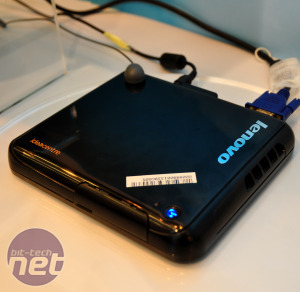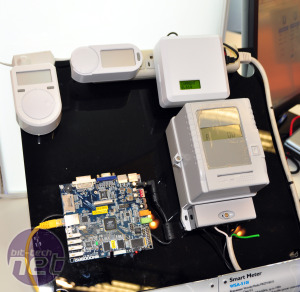What happened to VIA? Tablets, platforms and x86 v ARM
August 10, 2010 | 08:40

The next five years..?
BT: Wouldn’t that also be massive in the Western markets too?VIA: Yes, but the difference is a greater need for brand security. Not everyone wants branded goods though - an enthusiast will buy an Android tablet because they want the freedom to play with it - they are different markets.
That’s not to say the Chinese don’t want branded goods though – Chinese consumers still demand quality and something that works and looks good, and some of the phones out there are very well designed and look good. They are also starting to sell in the Middle East, South America and India.
In the future will consumers want a product that looks like everyone else’s or will they want a product that’s slightly different and more personal? One thing Chinese manufacturers are very good at is small production runs - they’ll go for niche market sectors rather than a big supplier that will design one mass-market product, so we’ll see innovation and differentiation around that.
BT: How’s your USB 3 products coming along – is it available yet?
VIA: We have a hub and host controller. The hub is already available and the host controller is shipping soon [from the interview date on 19th July 2010].
BT: Is that better than the NEC in terms of price and features?
VIA: Our host controller has four ports – it’s the only one out there with four ports. I think many people and journalists don’t realise how wide a scope VIA is involved in the [supplementary] chipset business – we do USB, Ethernet, Firewire etc. And that’s how we got started building our own complete mini-ITX boards for example, because we have all the parts there to use together.


Left: The Lenovo Narue is a tiny HTPC powered by a 1.3GHz VIA Nano x86 CPU and Chrome 9 GPU, running Windows 7. Right: VIA's prototype of a smart home monitoring system.
BT: What do you see the next five years bringing?
VIA: We’re agnostic – both platforms [x86 and ARM] have their place in the market. Now if you look at Intel obviously they will say that x86 is the best for everything, but I think the reality is that the answer is no – there are certain areas such as smartphones that x86 cannot reach right now, but if we project it out and see manufacturing nodes get better there’s better potential for the architecture in such devices. We will still drive x86 as a core part of our business - cloud computing, digital home - the PC, notebook etc, and then a lot of attached devices are based around ARM. Our strategy is to offer both, depending on what the market needs from each product.
The death of the PC gets announced now and again but I think the answer is no – the PC will not die, especially for applications like content creation and high-end digital media-
BT:-But that’s classed as workstation, not your home computer-
VIA:- But what are consumers more familiar with? If you look at the next generation of connected TVs – manufacturers are trying to make a HDTV more like a PC so it can do Flash and things that are not normally available on ARM platform. There will always be demand in a house for a large screen device to manage everything.
The PC feature set has been expanded considerably in the last 20 years – so it could be argued will it be called a TV or a PC? I still think it’ll be called a PC. People who started off with netbooks, mobile phones and tablets will also move towards PCs as they demand more powerful content creation capability so the ‘PC’ market will continue to grow. It’s not as sexy as the mobile phone market or even the tablet market, but if you look at the number of PCs that ship, it’s still a huge number, and there are still developing markets the current consumption rate is not so high compared to other markets so we will continue to see growth there.
From here on, things got turned around and VIA started firing us a few questions of its own!
VIA: Are your readers still interested in VIA?
BT: It’s something people ask for! Five years ago people were buying motherboards with VIA chipsets, but then that disappeared, and then there was EPIA boards that offered a niche of enthusiast ideas. We think people are still curious what changed.
VIA: What’s a next generation enthusiast project? People have done overclocking, so what's next? Is it perhaps wiring up your whole house with LED lighting and then controlling it all from some PC or Android device? The home automation thing will become bigger and bigger and obviously 90 per cent of people will just want something that works, but that leaves a considerably 10 per cent of people hacking it to do more customised things – like tasering someone if they illegally enter your house! Ha ha!
Not that we're advising that kind of project - but let us know your thoughts on VIA's strategy, cheap tablets and what's next for enthusiasts in the forums.

MSI MPG Velox 100R Chassis Review
October 14 2021 | 15:04








Want to comment? Please log in.